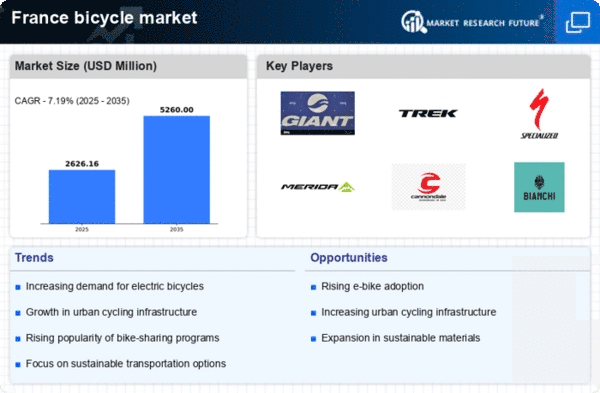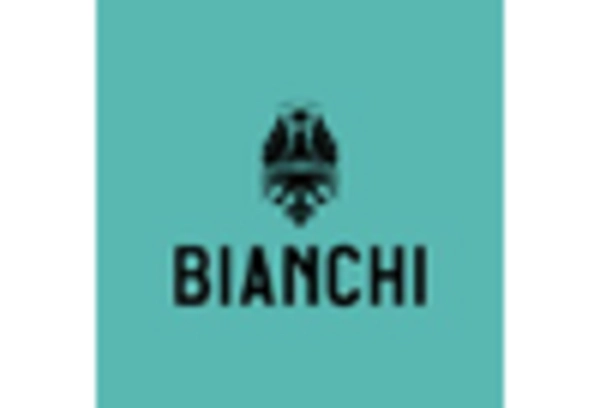Environmental Regulations
The bicycle market in France is influenced by stringent environmental regulations aimed at reducing carbon emissions. The French government has set ambitious targets to decrease greenhouse gas emissions by 40% by 2030. As a result, there is a push towards promoting cycling as a viable alternative to motor vehicles. This regulatory environment encourages consumers to consider bicycles as a sustainable mode of transport. The bicycle market is likely to see an increase in sales as more individuals seek eco-friendly transportation options. Additionally, manufacturers are responding by developing bicycles that meet these environmental standards, further stimulating market growth.
Urban Mobility Initiatives
The bicycle market in France is experiencing a notable boost due to urban mobility initiatives. Local governments are increasingly investing in cycling infrastructure, such as dedicated bike lanes and parking facilities. This investment aims to reduce traffic congestion and promote sustainable transport options. In 2025, it is estimated that cities like Paris will allocate approximately €50 million towards enhancing cycling infrastructure. Such initiatives not only encourage cycling as a primary mode of transport but also contribute to the overall growth of the bicycle market. The emphasis on urban mobility aligns with broader environmental goals, making cycling a more attractive option for daily commuters.
Health and Fitness Awareness
A growing awareness of health and fitness among the French population is significantly impacting the bicycle market. As more individuals prioritize physical well-being, cycling emerges as a favored activity. Reports indicate that around 30% of the population engages in cycling regularly for exercise. This trend is further supported by the increasing availability of fitness-oriented bicycles, catering to various consumer preferences. The bicycle market benefits from this shift, as health-conscious consumers are likely to invest in quality bicycles and accessories. Consequently, the market is projected to grow by 15% in the next few years, driven by this health-centric approach.
Tourism and Recreational Cycling
Tourism plays a pivotal role in the bicycle market in France, particularly in regions known for their scenic routes and cycling trails. The country attracts millions of tourists annually, many of whom seek cycling experiences. In 2025, it is estimated that cycling tourism will contribute approximately €1 billion to the economy. This influx of tourists stimulates demand for rental bicycles and related services, thereby benefiting the bicycle market. Additionally, local businesses are increasingly catering to this demographic, offering guided tours and cycling events. The synergy between tourism and cycling is likely to foster further growth in the market.
Technological Advancements in Cycling
Technological advancements are reshaping the bicycle market in France, with innovations enhancing the cycling experience. Features such as smart bike technology, GPS navigation, and integrated safety systems are becoming increasingly popular among consumers. In 2025, it is projected that the market for smart bicycles will grow by 20%, reflecting a shift towards more connected and user-friendly cycling options. These advancements not only attract tech-savvy consumers but also improve safety and convenience, making cycling more appealing. As technology continues to evolve, the bicycle market is likely to expand, catering to a diverse range of consumer needs.
















